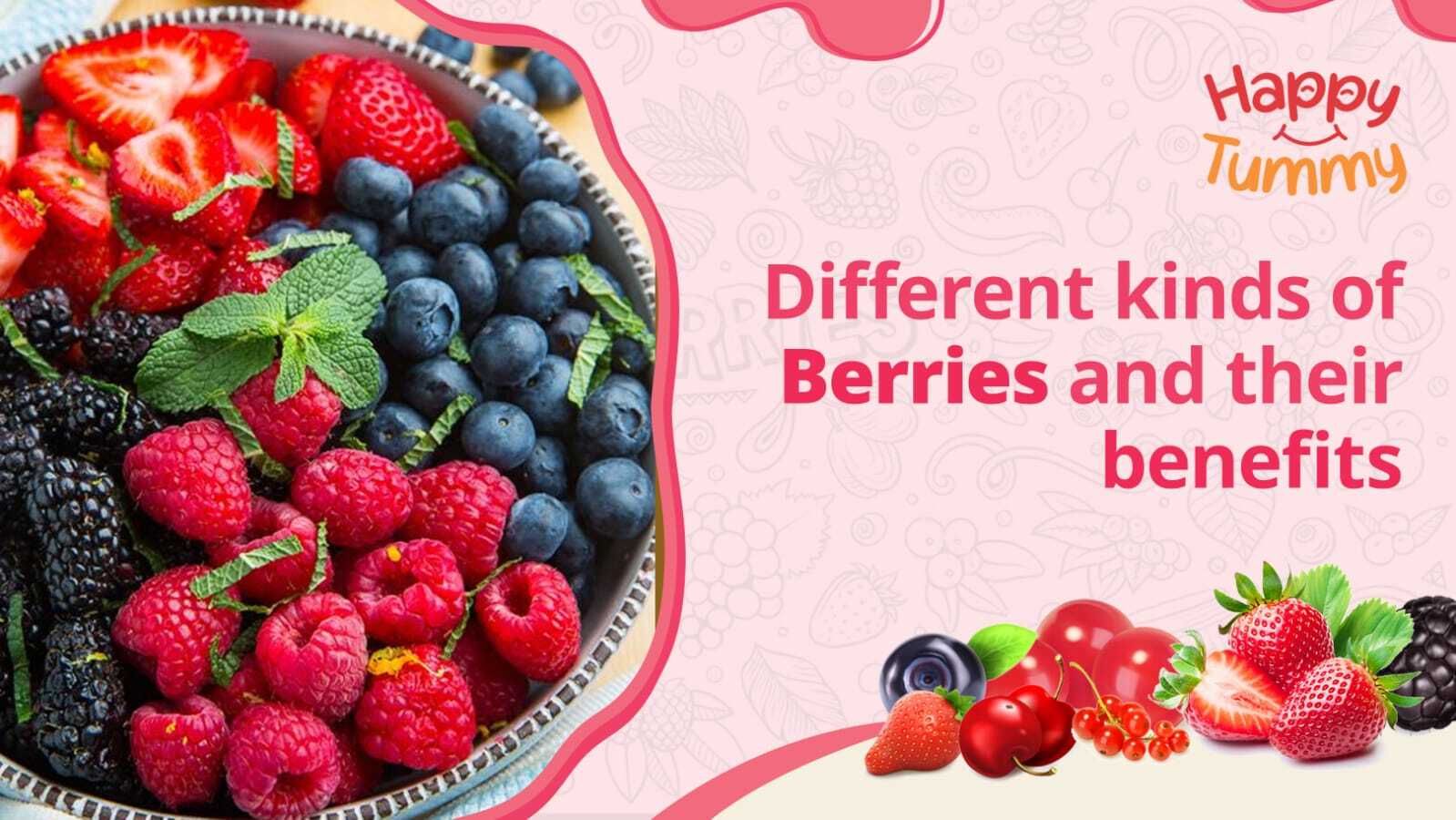Table of Contents
Berries are among the world’s most versatile foods. You may purchase them from the grocery store, cultivate them on your own, or harvest them in the wild. Hundreds of different types of berries exist, from the well-known strawberry to the untamed huckleberry.
Some berries stand out like miniature champions, offering high levels of vitamins, fiber, and antioxidants, but all berries deserve a place on your plate for the various health benefits that they offer.
The list of berries is too colourful, ranging from everyday favourites like strawberries to more unusual varieties like goji berries. Prepare to explore the wealth of berries and understand how including them in your diet may benefit your health.
#1 Strawberries
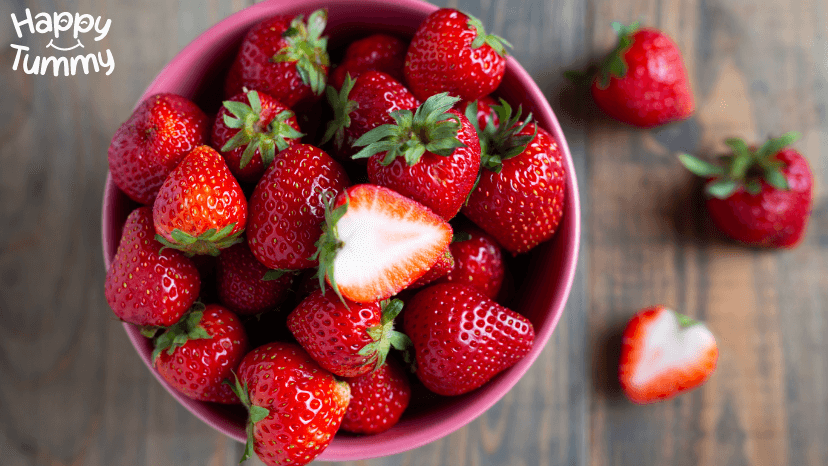
A classic summertime fruit, strawberries taste great fresh from the basket, in lemonade, or on shortcakes. Additionally, they can also be the most delicious method of maintaining good health while deriving optimum nutrients from the same.
Nutrient Profile
Strawberries are calorie-efficient and packed with nutrients. They are naturally low in sugar, yet they taste good. That’s a combination that’s hard to beat. [1]
| Nutrient | Amount per 100g |
| Calories | 24.61 kcal |
| Water | 92.03 g |
| Carbohydrates | 3.40 g |
| Sugars | 3.56 g |
| Potassium | 153 mg |
| Calcium | 50.20mg mg |
| Fibre | 2.50 g |
1. Strengthens Immune System
Since your body cannot synthesize vitamin C (ascorbic acid), you must obtain it from diet. Strawberries are a fantastic source of this nutrient. Vitamin C is essential for the healing of wounds.
Furthermore, strawberries’ antioxidants may shield cells from oxidative stress, exacerbating chronic illnesses and diseases.[2]
2. Support Heart Health
The antioxidants in strawberries, known as anthocyanins, offer several possible health advantages, such as managing heart disease and inflammatory diseases.[3]
Strawberries are rich in antioxidants and fibre, which may help manage cholesterol and triglycerides and benefit the heart.[4]
The flavonoid quercetin, present in strawberries, is naturally anti-inflammatory and may aid in reducing the risk of atherosclerosis. Strawberries are also a good source of folate and Potassium, which are vital for heart health.[5]
3. Aids Gut Health
Strawberries are a great source of fibre and polyphenols, which have prebiotic qualities, providing the good bacteria in your gut with fuel. Thus, including strawberries in your diet may encourage good bacteria growth.[6]
Strawberries are, therefore, a great source of antioxidants, fibre, potassium, and vitamin C, among other elements that support a variety of health advantages.
You can easily include this fruit in a healthy diet by adding it to a spinach salad, sprinkling it over yoghurt, or simply consuming it during your mid-morning or evening snack time.
#2 Blueberries
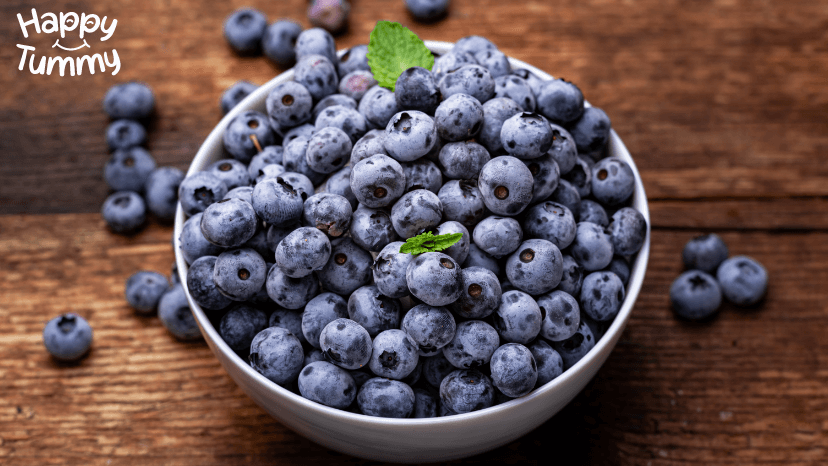
Blueberries are dark blue edible fruits. They have a sweet and sour taste and are almost seedless, which makes them trendy.
Nutrient Profile
Antioxidants, vitamins, and minerals found in blueberries offer significant health advantages. [7]
| Nutrient | Amount per 100g |
| Calories | 57 kcal |
| Water | 84.2 g |
| Carbohydrates | 14.49 g |
| Sugars | 9.96 g |
| Vitamin C | 9.7 mg |
| Calcium | 6 mg |
| Potassium | 77 mg |
| Magnesium | 6 mg |
| Phosphorus | 12 mg |
| Fiber | 2.4 g |
1. Rich Source of Antioxidants
Blueberries are among the most effective plant-based sources of antioxidants. They are often known as the king of Antioxidant foods. [8]
Free radicals are harmful substances that can damage our cells and antioxidants present in these berries may help defend against them.
2. Support Immune Health
With 70–80% of immune cells being present in the gut, blueberries, which are high in phytochemicals, vitamins, and fibre, may play a vital role in promoting the growth of good bacteria and gut health.[9]
The good bacteria in our digestive tract are crucial for the immune system, as they possess immunomodulatory properties and work together with the immune system to protect us against diseases.
3. Improves Cholesterol Levels And Heart Health
Blueberries’ high potassium and fibre content may help manage heart health.[10] The antioxidants in blueberries are strongly linked to reduced levels of oxidised bad LDL Cholesterol. Additionally, they are also known to reduce inflammation.
So, as a snack, eat some dried or fresh blueberries. Include them in your diet for their nutritional value and flavourful boost.
#3 Raspberries
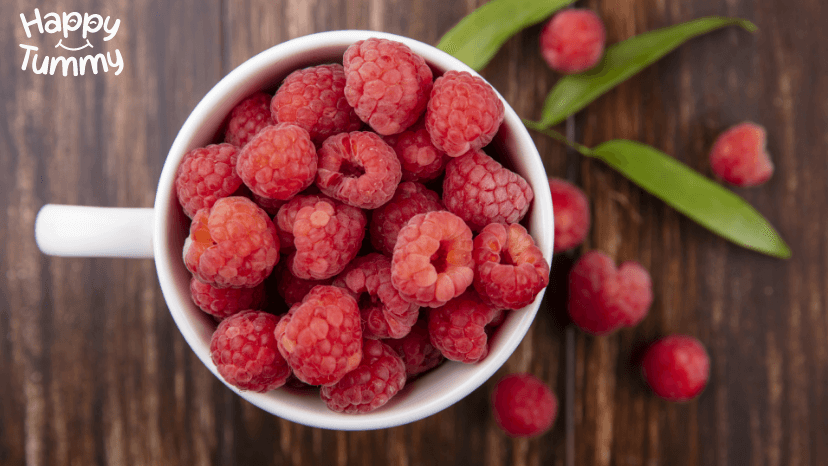
Raspberries are not only delicious and versatile but also bring a burst of flavor to any season. Due to their remarkable nutritional profile, they are among the healthiest options in the produce section.
Nutrient Profile
Like other berries, raspberries are rich in antioxidants, fibre, vitamins, and minerals. All of them are good for your health.[11]
| Nutrient | Amount per 100g |
| Water | 85.8 g |
| Energy | 52 kcal |
| Protein | 1.2 g |
| Carbohydrate | 11.9 g |
| Sugars | 4.42 g |
| Fibre | 6.5 g |
| Calcium | 25 mg |
| Magnesium | 22 mg |
| Potassium | 151 mg |
| Vitamin C | 26.2 mg |
1. High in Fiber
Raspberries provide 6.5 grams of fibre per 100 grams, making them one of the most excellent whole-food sources of fibre. [12]
Raspberries’ fibre and water content may help prevent constipation and support a healthy digestive tract. A sufficient amount of fibre contributes to the regularity of bowel movements, which is crucial for the daily elimination of toxins.
2. Supports Brain Health
Quercetin, anthocyanins, ellagic acid, and vitamin C are antioxidants found in raspberries that help shield brain cells from free radical damage.[13]
Raspberries may assist in maintaining cognitive function, as studies have suggested that eating a diet rich in antioxidants may promote brain and neurological health. Antioxidants like vitamin C are also reported to protect a person’s ability to think and remember information as they age. [14]
Consuming fresh raspberries, preferably with no additional toppings, is advisable to obtain maximum nutritional benefits.
#4 Blackberries
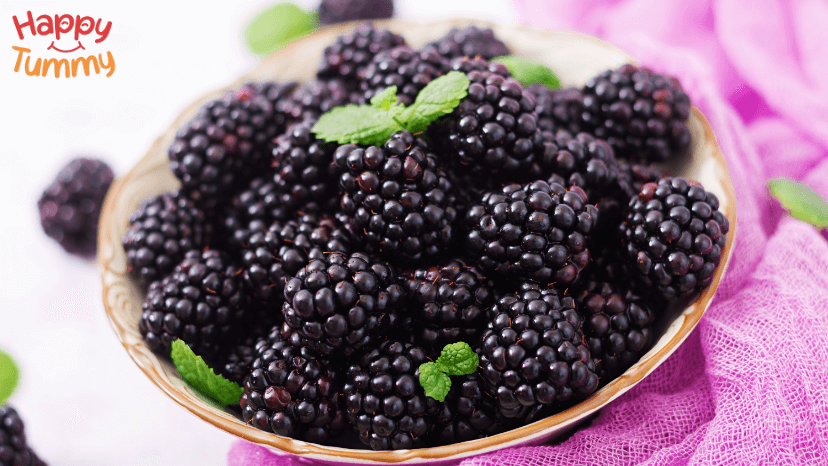
Packed with minerals that promote health, blackberries have a purple tint.
Nutrient Profile
Blackberries are high in fibre, vitamins, and minerals yet low in calories. This is a breakdown of the nutrients in 100 grams of blackberries.[15]
| Nutrient | Amount per 100g |
| Calories | 43 kcal |
| Water | 88. 2 g |
| Carbohydrates | 9.61 g |
| Fibre | 5.3 g |
| Sugars | 4.88 g |
| Vitamin C | 21 mg |
| Calcium | 29 mg |
| Potassium | 162 mg |
| Magnesium | 20 mg |
| Phosphorus | 22 mg |
| Manganese | 0.646mg |
| Vitamin K | 19.8µg |
1. Rich In Vitamins And Minerals
Manganese, vitamin K, and vitamin C are all abundant in blackberries. These nutrients are necessary for your body to perform the following tasks:
- Iron absorption, wound healing, and a robust immune system depend on vitamin C. Additionally, it may have antioxidant properties that help fight off free radicals. [16]
- Vitamin K is essential for healthy bones and blood circulation.[17]
- Manganese is involved in energy generation, immunity, blood coagulation, bone formation, reproduction, and cell damage prevention.[18]
2 Inflammation Management
Blackberries’ abundance of potent antioxidants known as polyphenols is one of its primary advantages.[19] By eliminating unstable molecules known as free radicals, antioxidants assist you in combating stress and free radical-associated damage.
Due to its polyphenolic content, it is used for influenza treatment in combination with other medicinal plants worldwide.
Additionally, anthocyanin, the masked hero that contributes the deep purple colour to blackberry, has a high antioxidant capacity and may help reduce body inflammation, protect brain health, and enhance cognitive function.
For a tasty approach to health care, try keeping fresh or frozen blackberries in your kitchen and incorporating these nutrient-dense fruits into recipes like muesli, smoothies, and baked goods.
#5 Cranberries
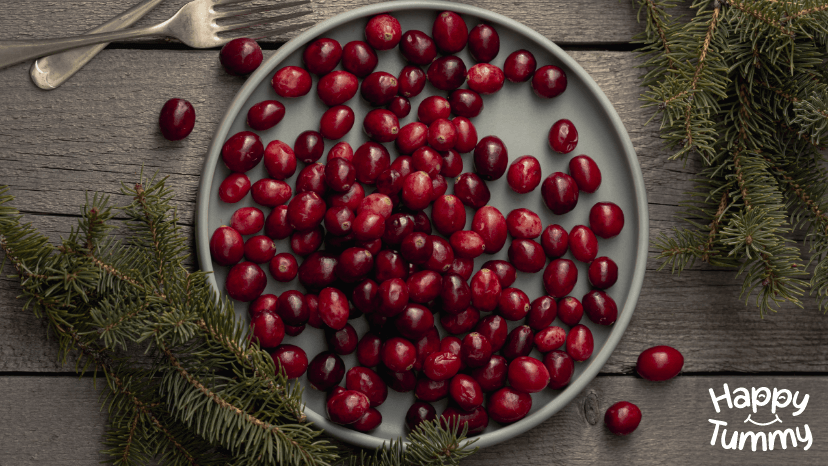
The little, round, firm, crimson fruits known as cranberries have an acidic or bitter taste. Although they’re frequently considered a Thanksgiving essential, they may also be used in sauces, smoothies, muffins, and other recipes all year.
Nutrient Profile
Antioxidants and other vitamins are abundant in cranberries. Here is the nutritional profile [20]:
| Nutrient | Amount per 100g |
| Water | 87.3g |
| Calories | 46 kcal |
| Carbohydrates | 12.2 g |
| Sugars | 4.27 g |
| Fibre | 3.6 g |
| Calcium | 8 mg |
| Potassium | 80 mg |
| Magnesium | 6 mg |
| Phosphorus | 11 mg |
| Vitamin C | 14 mg |
1. Anti-Ageing Properties
Oxidative stress and inflammation have a significant relationship with aging. Cranberries’ anti-aging properties may help postpone the aging of cells and tissues by reducing oxidative stress, leading to healthy skin.
Cranberries’ anti-aging properties have been attributed to their high polyphenolic content, with flavonoids being the most abundant.
2. Promotes Eye Health
These little but powerful berries are a great source of essential nutrients, including vitamins A and C and potent antioxidants. [21]
These nutrients may help manage oxidative eye damage from UV rays and other environmental stresses.
3. Good For Gut Health
Cranberries benefit your immune and digestive systems, and a healthy gut is necessary to preserve general well-being.
They are high in fibre and may offer prebiotic advantages, which may lower the risk of indigestion by promoting the growth of good bacteria in the stomach. [22]
Add fresh cranberries to salads, yoghurt or muesli to enjoy their nutritious value and tart taste.
A Quick Review
Regardless of your preferred flavor, every berry, from sharp and colorful raspberries to sweet and luscious blueberries, has a potent nutritional punch ready to savor.
Every time you include foods high in nutrients, like berries, in your diet, you’re taking steps towards achieving your nutrient requirements and improving your general health. So, take a handful of these and enjoy the taste of health!
Think of berries as a team, all with a role to play in your health.
Frequently Asked Questions
Unsurprisingly, berries, including raspberries and blueberries, are among the healthiest fruits available. They are rich in antioxidants and low in sugar.
Because all berries have a high water & Fibre content, they may be an excellent choice for managing weight. Although various berries’ nutritional profiles vary significantly, they all provide vital vitamins and minerals that promote overall health and well-being.
Eating berries daily is okay as a part of your diversified, balanced diet. Berries are among the healthiest foods you can eat. They are packed with nutrients & antioxidants supporting a healthy heart, cholesterol & weight management, cognitive health, and immune system.
Consuming too many berries may result in some undesirable effects that one must look after. Eating berries may have adverse effects such as:
Allergies: Those who are allergic to berries may experience itching.
Digestive problems: Excessive berry consumption may cause digestive comforts such as constipation or bloating, owing to their high fibre.
If you want to know which berry will work best for your health, you can make an appointment with our certified nutritionist to discuss. Schedule a 45-minute consultation and get a customised nutrition plan created just for you.












